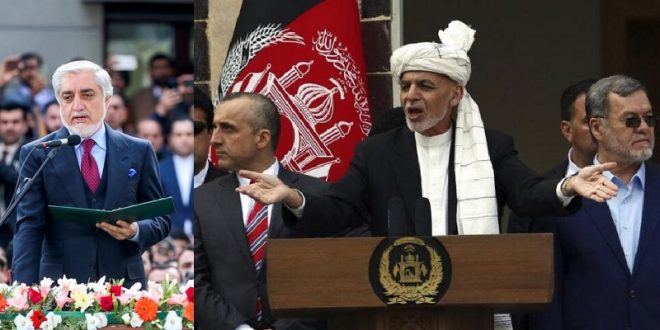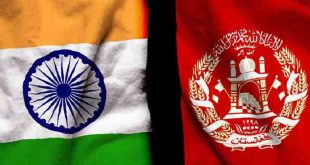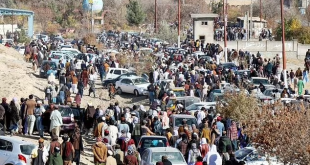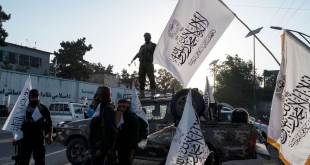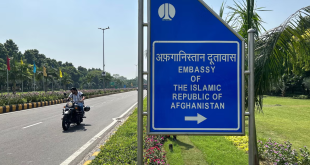U.S. diplomacy to mediate between feuding leaders counterintuitively foundered, pitching the war-scarred country into political chaos
Ghani takes oath of president
His opponent Abdullah holds parallel inauguration
Rockets strike near ceremonies
AT News
KABUL: Afghanistan encountered another perilous moment after its two pretenders to the throne were each sworn in as president in separate ceremonies on Monday, plunging the country’s political future and reconciliation prospects into chaos – as precarious peace negotiations with the hardline Taliban loom.
President-elect Ashraf Ghani took oath of the office for a second term in the presidential palace, while, at the same time, his main rival for the presidency swore himself setting the foundation of his ‘parallel government’.
This signalled that diplomatic attempts by the U.S. special envoy Zalmay Khalilzad the day earlier to mediate between the political rivals and broker a deal had foundered. The dilemma risks spilling into the impending peace talks with the Taliban – an inevitable fallout of a rancorous wrangling that could culminate in a disaster Afghans cannot afford.
Last week’s U.S.-Taliban peace agreement – hammered out after 18 months of marathon negotiations – offered an olive branch to the people and government of Afghanistan towards an end to the endless war. Nevertheless, two presidents would mean two peace forces, which could potentially complicate and even stymie the reconciliation process.
The two swearing-in ceremonies were held at the same time, with Ghani’s in the presidential palace and Abdullah’s in his palace just next door. The inaugurations, however, fell short of participation of influential political elite such as Hamid Karzai, Abdulrab Rasoul Sayyaf and Gulbuddin Hekmatyar. But, the US envoy Khalilzad, US Chargé d’Affaires Ross Wilson, and US, NATO forces commander Gen. Scott Miller, as well as ambassadors from the EU, Canada, Australia, Denmark, Germany and Norway attended president Ghani’s oath-taking ceremony.
In a surprising seeming change in rhetoric, Ghani vowed during his inaugural speech to issue a decree on Tuesday about the release of Taliban prisoners. “Their release is intertwined with the nation’s security and peace and a decree will be issued in this regard tomorrow,” he said.
During the ceremony, rockets landed near the presidential palace, rattling some of those attending even as Ghani urged them to stay. Interior Ministry spokesperson, Nasrat Rahimi, said four rockets hit near the palace, and one policeman was injured.
After the feuding leaders announced plans for their swearing-in, Kabul’s major allies including the United States reacted sharply to the idea, prompting a chorus of disapproval and attempts to broker a reconciliation between the two to prevent the inevitable.
This is as U.S. envoy Khalilzad met with Ghani and Abdullah several times on Monday to find a solution to the standoff. He shuttled between the offices of both the leaders until midnight to see if Abdullah would agree to a ‘compromise’ and become a senior minister or the head of a peace council in Ghani’s government.
Sources confirmed that Abdullah had demanded an executive prime minister’s role to oversee the peace process, and to hold sixty percent of the political posts in the government, which was rejected by President Ghani. They also indicated that the president had proposed a power-sharing plan with Abdullah in the areas of security, governance and peace and offered Abdullah 40% of his cabinet, including one National Security Council member post, and the chairmanship of a “Supreme Peace Council” to Abdullah, which would engage in negotiations with the Taliban. That proposal would also dictate all national security ministries and institutions would report exclusively to the president.
The saga of electoral deadlock began following elections in September 2019 that were widely denounced as fraudulent after the election commission declared Ashraf Ghani as the president bypassing his rival Abdullah’s irreconcilable demands for getting rid of “bogus” votes. Ever since, Abdullah had signalled that he would mount a serious challenge to the country’s president, arguing that Ghani’s win was not authentic because of vote-rigging in a repeat of the 2014 elections marred by fraud.
 Afghanistan Times
Afghanistan Times
